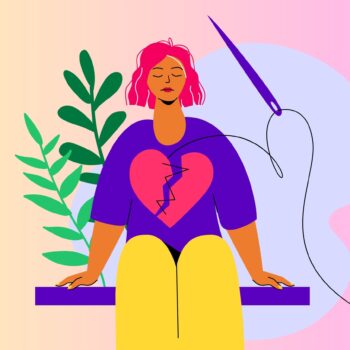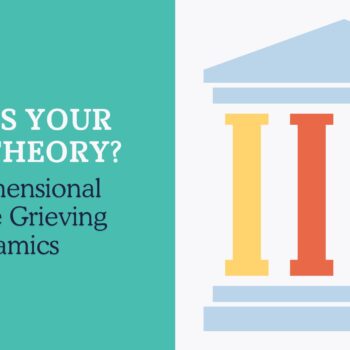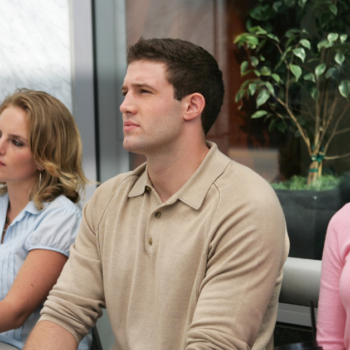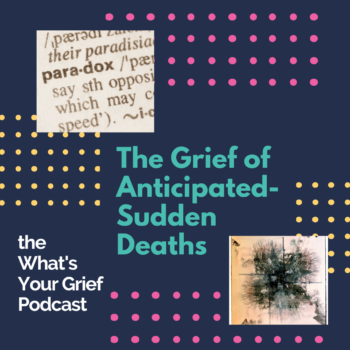What is 'Toxic Positivity' in Grief?
/ General : Litsa
Toxic positivity. It’s the new buzzword for the year, it seems. Our DMs and emails have blown up with questions about toxic positivity in grief recently. Is this an example of toxic positivity? What is the difference between positivity and toxic positivity? If I’m focusing on gratitude, is that actually bad? Is positivity hurting my grief? If positive psychology is good, why is positivity bad? Is toxic positivity real?
It’s confusing, I know! We’re going to try to clear up some of the questions here. But in case you make it no further than this sentence, let me make one thing very clear: all positivity is NOT “toxic positivity” and positivity is NOT bad in grief. In fact, it can be really important. Now, I hope you’ll keep with us, but at least we have that out of the way.
What is “toxic positivity”
There is no singular definition for ‘toxic positivity’. It isn’t a psychological or academic term. But there is a pretty well agreed upon gist: toxic positivity is promoting the ideal or goal that, no matter the circumstances, one should always and only maintain a positive, happy or optimistic mindset. As a griever, I am sure you know what we’re talking about. No matter your loss and it’s devastating grief aftermath, you’ve probably heard plenty of people encouraging you to just “stay positive”, “focus on gratitude”, “look on the bright side”, etc.
Why does it seem like suddenly everyone is talking about toxic positivity?
Good question. The “good vibes only” attitude is not new, so on the surface it may seem strange that it is only gaining notoriety (and strong social media push back) lately. Though I can’t say for sure why this is, I have a strong feeling 2020 had a little something to do with it. For the first time, we as a collective society were going through something terrible. All of a sudden all of those “just be positive” and “what you believe is what you’ll manifest” social media images started looking *pretty* obnoxious and tone deaf.
Now, we grievers have been yelling this from the rooftops for quite some time now, I know. We’ve been trying to explain that we can’t positive-vibe our way out of grief, often to a crowd of friends saying things like, “you’re amazing, you’re strong, you’re going to land on your feet, just get back to the gym and think good thoughts and you’ll be back to normal in no time!”. It felt like they would never “get it”. Until 2020, when suddenly some people started to understand why this language wasn't useful. It turns out being amazing and thinking good thoughts while taking a walk doesn’t solve everything.
Positivity is not a dirty word (and not all positivity is toxic positivity)
Now, I have to be honest. On the one hand, I’m thrilled there is a new recognition that it isn’t helpful to tell people their problem is that they just aren’t being positive enough (and if they were they would have already manifested their best life). On the other hand, I think there is a danger that all this hype around “toxic positivity” puts us at risk of ignoring the incredible, evidence-based value of positivity. We don't want this to be a situation of throwing the baby out with the bathwater.
Here is the thing, toxic positivity encourages us to ignore or deny things that are hard, painful, overwhelming, difficult, confusing, etc. It says, “ignore the storm, focus on the rainbow. And even if you don’t see a rainbow, pretend you do. If you pretend long enough and hard enough, a rainbow will finally appear. And if it doesn’t, it must be because you weren’t trying hard enough”.
But here is the thing about rainbows – they require the storm. (Man, normally we hate rainbow analogies around here. Sorry, but it just kind of works in this case). They don't require us to deny the storm, ignore the storm, or avoid the store.
Regular-old-positivity, it allows us to acknowledge the storm. Regular positivity creates a space where we recognize that life can be both ugly and messy and hard and dark and complicated. But, at the same time, it can also have moments of joy, hope, gratitude, and optimism. In our darkest moments, this kind of positivity is hugely beneficial and research has shown us the benefits of positivity in grief, time and again.
Positivity in grief
Toxic positivity in grief tells us grief is a dirty word and our goal should be to put a smile on and get back to “normal”. When you stop and think about it, it really is an unreasonable task. It is asking you to repeat and believe something when there is clear evidence to the contrary. "Life is great!". We can only say that and try to believe it for so long before wanting to scream "my husband is dead! Life is not great!".
Positivity in grief allows us to say, “my life has been shattered, it will now never be the life I wanted, expected, or hoped for. But that doesn’t mean it will never be joyful, meaningful, or purposeful again”. Positivity allows us to say that sometimes we can feel hopeless and hopeful all at once. Sometimes we can feel total despair and still find small moments of gratitude. Sometimes we can say, “I have no idea how I am still surviving. But, I am grateful I opened my eyes this morning. I got out of bed and I am going to do it again tomorrow". Positivity does not ask us to deny the problems.
Humanity is about feeling the full range of human emotions.
We have said it 100 times before. We will say it 100 times again: emotions aren't good or bad, they just are. Yes, what we DO with those emotions can cause us trouble. But it is crucial that we allow ourselves to experience our feelings, the hardest ones and the easiest ones. It is equally important that we feel we can express those emotions without someone telling us to stop being so negative.
In his book, A Liberated Mind, Steven Hayes (founder of Acceptance and Commitment Therapy, one of our favorite types of therapy) says, "psychological flexibility is the ability to feel and think with openness, to attend voluntarily to your experience of the present moment, and to move your life in directions that are important to you, building habits that allow you to live life in accordance with your values and aspirations. It’s about learning not to turn away from what is painful, instead turning toward your suffering in order to live a life full of meaning and purpose.” Needless to say, Hayes was calling out "toxic positivity" long before it was cool.
He reminds us that our suffering is often part of what allows us to move toward our purpose and meaning. Learning to be with our suffering while still taking actions that are consistent with our values is the stuff of living.
Well-being is not about happiness. It is not even about everything being well.
Another psychology guy we love around here is Martin Seligman. In his book "Flourish: A Visionary New Understanding for Happiness and Well-Being" he makes an important distinction between happiness and wellbeing. He says that those who live with the ideal of a happiness principle focus just on increasing happiness (satisfaction) while eliminating things that detract from it. He suggests, in a world filled with things we cannot control that may decrease happiness and satisfaction, that it is crucial that we look to our well-being. This is about our relationship with our thoughts and feelings.
A sense of well-being, he says, is not just about having positive emotion. Rather, he says it is about a life that also includes engagement, relationships, meaning and purpose, and accomplishment. These things will not always be easy or bring us a sense of happiness. There will be moments of devastation and despair. But a strong sense of well-being will allow us to sit with those emotions and have confidence that they are not a failure, but a part of life; they are storms we will weather, with faith in our ability to survive.
Toxic positivity can come from the inside.
Though there is a lot of hype about external messages of toxic positivity, we can internalize these. Many times in grief we tell ourselves we should ignore the difficult stuff, focus on the positive. We may try to distract away from the hard emotions, looking to keep busy. We might become hyper-aware of gratitude, growth, and strength. The key is balance. Listen for the voice in yourself that might be pushing you to avoid and push back. Remind yourself that there is not only space for the hard stuff and the positive stuff, but we are most honest and human when we feel both. When all else fails, watch/re-watch Inside Out to remind yourself that we need to feel all the feelings (thanks Pixar!).
Toxic negativity can come from the inside too.
It is an all too common symptom of grief to want to stay in our deepest, darkest pain. Weird, I know. But sometimes we think our pain is the only thing that connects us to our loved one. [It isn't]. Sometimes we think our pain is the only reminder to us and those around us of how important our loved one's life was. Sometimes we can start to feel comfortable in our pain.
In these instances, we buck against all positivity, not just toxic positivity. We think if we acknowledge and positivity it means forgetting our loss. Remember, positivity and pain can live side by side. Neither cancels out the other. Finding hope, gratitude, or positivity never takes away from the significance of our loved ones life, death, or our grief. Instead, that positivity allows us to know that we can bring our loved one and our grief with us as we move forward in a life with meaning and purpose.
Subscribe below for a new grief support article each week in your inbox.

We invite you to share your experiences, questions, and resource suggestions with the WYG community in the discussion section below.
We wrote a book!
After writing online articles for What’s Your Grief
for over a decade, we finally wrote a tangible,
real-life book!
What’s Your Grief? Lists to Help you Through Any Loss is for people experiencing any type of loss. This book discusses some of the most common grief experiences and breaks down psychological concepts to help you understand your thoughts and emotions. It also shares useful coping tools, and helps the reader reflect on their unique relationship with grief and loss.
You can find What’s Your Grief? Lists to Help you Through Any Loss wherever you buy books:





Diana Clutter January 8, 2022 at 5:38 pm
I don’t even know where to start my son bipolar ADHD ODD AND CONDUCT DISORDER Shot and killed himself August 2 2021 That just about killed me inside I still have a hard time believing it
Gilles May 21, 2021 at 8:18 am
GB,
Your situation sounds similar to mine. My late wife and I were married just short of 23 yrs. My wife had a very rare immune disorder and by the time she was 21 she had had open heart surgery twice, lost the use of one lung and because of medication lost the ability to have children. She was divorced when we had met.
In 16 days it will be the 4 yr anniversary of her passing. Because her immune disorder (so rare that at the time of diagnosis she was the 4th known case in the world) her stomach cancer was hidden. All the symptoms of her stomach cancer pointed to side effects of her illness or the medications for her illness which in turn had the doctors chasing the wrong things. By the time she was finally admitted it was too late and she died 8 days after being admitted to the hospital. So many toxic statements floated in and out in so many ways. We have church/faith roots so “she’s in a better place now”, “at least she’s not suffering” (yes but I am), “at least you had the time you had together” and numerous others.
It is so hard when you try to move forward when you just want them back. I also lost both my parents to cancer and I am trying to deal with an 18 yr old high school dropout that is in denial with regard to mental health issues that he has been diagnosed with.
Positivity can help a bit to keep focus on the good around you but when it distracts from dealing with the hard things in your life that’s when it becomes toxic. I have been working with a psychologist now for close to a year, which I have come to depend on her, good or bad, to work through life.
I am former military and where I live I enjoy but I have almost no support structure. I have little to no support or good relationship with my family (only have one brother and one sister). I wouldn’t say that my in-laws are useless to me but they don’t contact me or stay in touch with us.
So much I could go on about. The easiest way to say it is that it is hard. We find ways through an up and down battle that oftentimes feels impossible.
Reid Peterson January 20, 2021 at 12:55 pm
Hi, thank you for your article. Do you think that Toxic Positivity is strongly associated with Denial, as in the stage of grief? It seems to me that many grievers don’t want to feel the pain because it’s difficult to see the benefits of leaning in or as Steven Hayes states “turning towards” the pain itself. It’s easy to numb, ignore, and even deny the more painful emotions of one’s grief.
Isabelle Siegel January 22, 2021 at 10:48 am
Reid, this is such an interesting and insightful perspective! I think you’re right: People often try to avoid difficult emotions because they believe they are “bad.” In reality, emotions are neither good nor bad. People must allow themselves to feel whatever it is they need to feel.
Karen March 3, 2021 at 1:11 am
I would disagree. I think it’s more that those around the person grieving don’t want to see their friend/ loved one in pain. So they try the “fix it” strategy, and try and be positive, in an attempt to take away the pain.
Also, the “stages of grief” aren’t really important. They weren’t meant to be applied the way they have been historically. Some people may experience denial, some may not. It’s also not linear, more like a giant squiggle, going up, down, side to side, possibly second by second, minute by minute, day by day, month by month, year by year. Grief is messy.
Mark Brisbane January 19, 2021 at 11:35 pm
I lost my wife to suicide 5 months ago. In a foreign country. We weren’t able to travel home during the last summer. I’ve quit my expat job and brought our boys back to my country…so much change. Covid was a big part of it, as a final straw for her bipolar depression. Like the gentleman above I prefer to grieve in private, though I do share with my two teenage sons. The article resonates with me as I am experiencing despair and hope simultaneously. I am focussed on being the best father I can be and keeping myself fit and healthy. Music is helpful; it makes me cry though, but it feels good, as if dignifying my experience and what I’ve lost. It’s really hard, but I am expecting that if I keep working towards the best me I can be, my life will be enjoyable once again. Thanks for the article – it helped. Mark, Melbourne, Australia.
Isabelle Siegel January 22, 2021 at 10:58 am
Mark, I’m so sorry for your loss. I can only imagine the pain you are going through. I hope this article has shown you how normal and okay it is to feel conflicting emotions–like hope and despair–simultaneously. There can be room for both. All the best to you.
Carmella L Russell January 19, 2021 at 1:24 pm
“Remember positivity and pain can live side by side.” Learning to allow them to do this this time around with grief has been an invaluable lesson for me. Thank you for sharing this information!
Claudia Brown January 19, 2021 at 10:03 am
Insightful writing. It is nice to know that pain and hope can walk together. This has been very helpful to me.
Isabelle Siegel January 19, 2021 at 12:06 pm
Claudia, I’m glad to hear that this article was helpful to you! It’s so important to acknowledge that pain and hope can exist simultaneously. All the best to you.
Dee Rhea January 19, 2021 at 10:00 am
I have never heard of toxic positivity, yet this article gave the ability to look back and think “Yes!” People did that to me after I lost my husband of 21 years. Yet having been in that situation I am left with this one thought. “What do we say?” I have asked this over and over in my mind. Of course having actually been in this situation I could think about what I wanted people to say and just know. Yet the truth is there was a while that I didn’t want people to say anything. Then there was a time that I wanted people to ask so I could talk about it. I am now getting to a time when I have questions. Tons of them. Not questions for just anyone but questions for other widows. I have thought about joining a grief group but I am very hesitant. My biggest question for them would be “what do we say!!”
Dee
Isabelle Siegel January 19, 2021 at 12:09 pm
Dee, I’m very sorry for your loss. You may be interested in this article: https://whatsyourgrief.com/what-should-i-say-to-someone-grieving/ I think joining a grief group has the potential to be very beneficial. You may also want to check out this article, which discusses some pros and cons: https://whatsyourgrief.com/grief-support-groups-positives-and-pitfalls/ All the best.
GB January 19, 2021 at 7:32 am
Thank you!
This is exactly what I am miserably going through with my 2 daughters!
They dont want me to show any grief after tragically losing my wife of 38 years (44 in love as HS sweethearts).
It was August 9 2018 and they still dont get it and dont want to hear it. Yes I have grandkids but when those moments are over- its all me. Plus while being with them I only think more of who is NOT with them. But my daughters are all “rainbows and unicorns” as you say here and think I need mental help and I DO NOT! This is the new me-its too damn bad. I will never be the same -EVER. I no longer want to go to the beach and see and feel the pain of places we used to love. It hurts and I refuse to walk right into “triggers”! But they continue to pound me with “its you Dad and you can change-you just dont want to- you need help”! NO I do not and have told them this. I said I will grieve every day for the rest of my life. The situation we were tossed into was horrible and she died from undetected cancer at at the worst time as we both finally retired and bought a great home-we worked so hard to get to our Golden years and she quickly left me and this earth only 2 months after diagnosis at age 62! She worked all her life to get to it and she/we got totally screwed/robbed at the worst time! Now I sit in retirement misery alone in a too large home-alone. Yet they demand vanilla cones and sprinkles every single day and come on vacation to the beach and come to parties and Happy Holidays and dont forget Valentines Day Dad for the kids etc…Oh yes gear it up Dad on one of your worst days and dont bring your unhappy face just because it was your wedding anniversary! Dad stop talking about things already-you have to move forward-its not healthy to keep thinking and going over things. Their “toxic positivity” makes me feel worse and they just dont seem to get it. As I tell them I do the best that I can and if its not enough I dont know what to tell you. I wear a mask at all events-I have to-just so they cant say “Dad you ruined this”. I am getting used to that but I refuse to go on happy vacations- I dread the summer because now the inground pool we always dreamed of and finally got? I sit in it alone and wish I could fill it with concrete. My own daughter doesnt help because they never bring the kids over even in summer heat. Since all unfolded at this house with home hospice and there are memories they have of it and some moments were tough and scary-I know call this the “house of pain” that nobody wants part of! It was to be our grandparents home full of life and now its a sad “tomb” rarely visited and if so a strict time limit seems to be in affect. But Dad come to our house and spend 4-5 hours! If I get an hour here I am lucky-most visits are less than 30 minutes and out they go. My wifes ashes that I put in our living room-totally ignored and not once has my daughter gone over to acknowledge and I see this and it hurts me. It crushes me and causes all kinds of thoughts. I guess she feels I should toss them in some closet? But everything around her must be positive-no chance of real life even getting into her home or life-her kids in a constant Disney like trance and lifestyle of rainbows and sprinkles. I wish I could just sell the house pack up and move and be left alone. That would be ok- My Mom did it when Dad passed as she stayed alone in Florida for 32 years later-would come up once in awhile and we only did a few trips down there. It was all ok she was content to stay and did not feel the need to be with her grandkids= yet she was a good Grandma just not one of those intruding every day ones-its OK! I wish I could be the same-live in another state and phone calls were good enough. Not demands to be here and he there for this and that and when I say I dont think so all I get is attacked and called anti-social! It sucks -I am grieving and always will! This TOXIC baloney unfortunately is true and I just wish my daughters would understand and let me be just as my Mom used to say. I try and do my best and every day is not “wine and roses”. Just because my kids want to portray a Disneyland life and attitude does not mean I have to!
Just because I cut my time short when there-doesnt mean anything more than -thats it I have had enough- I am done.
Those hopes and dreams of endless weekends and a wonderful retirement were ripped away from me. Its just different now-it just is and never to be the same. So call me “Mr Negativity” as I have been accused of for just being Mr Reality….they dont get it and I guess sadly they never will and I handle the days till I share my companion urn with the one I love and will be put away together forever. It sucks to say they may never “. But one day they will.
Isabelle Siegel January 19, 2021 at 12:11 pm
GB, I’m truly so sorry for your loss. My heart goes out to you. I’m also very sorry to hear that your daughters aren’t giving you the space you need to feel your emotions. Have you tried speaking with them about this?
GB January 19, 2021 at 10:09 pm
Thanks Isabelle- At times I have but it does not seem to get very far. I get they have their lives and they are good and they are happy. But i wish they could accept that I am not and if only once either could sit with me and ask”how you really doing Dad- just want you to know we miss her too but are proud of you and her”. Something like that and just not getting as I hit 3 sad years in August.
My son says to stop looking for that Hallmark movie moment. That they have moved on or at least show that to us. I expected it to be different-how I really dont know.
Jackie January 20, 2021 at 10:41 pm
GB, I just want to validate your feelings, I think it stinks that they are acting that way. It hurts you, disrespects their mom’s passing, and also robs themselves and your grandchildren of an opportunity to grow close, help eacher other through it and model healthy greiving. I would be just as angry as you.
My relationship with my only living sister has grown cold since my son died to suicide. Its the same kind of stuff- she can’t handle my sadness and has to keep control over positivity.
My only suggestion is that you stand your ground and push back at them if you need to.
I’ve done that with a few people. May or nay not work.
Take care of yourself & nourish your loved one in your heart no matter what anyone says.